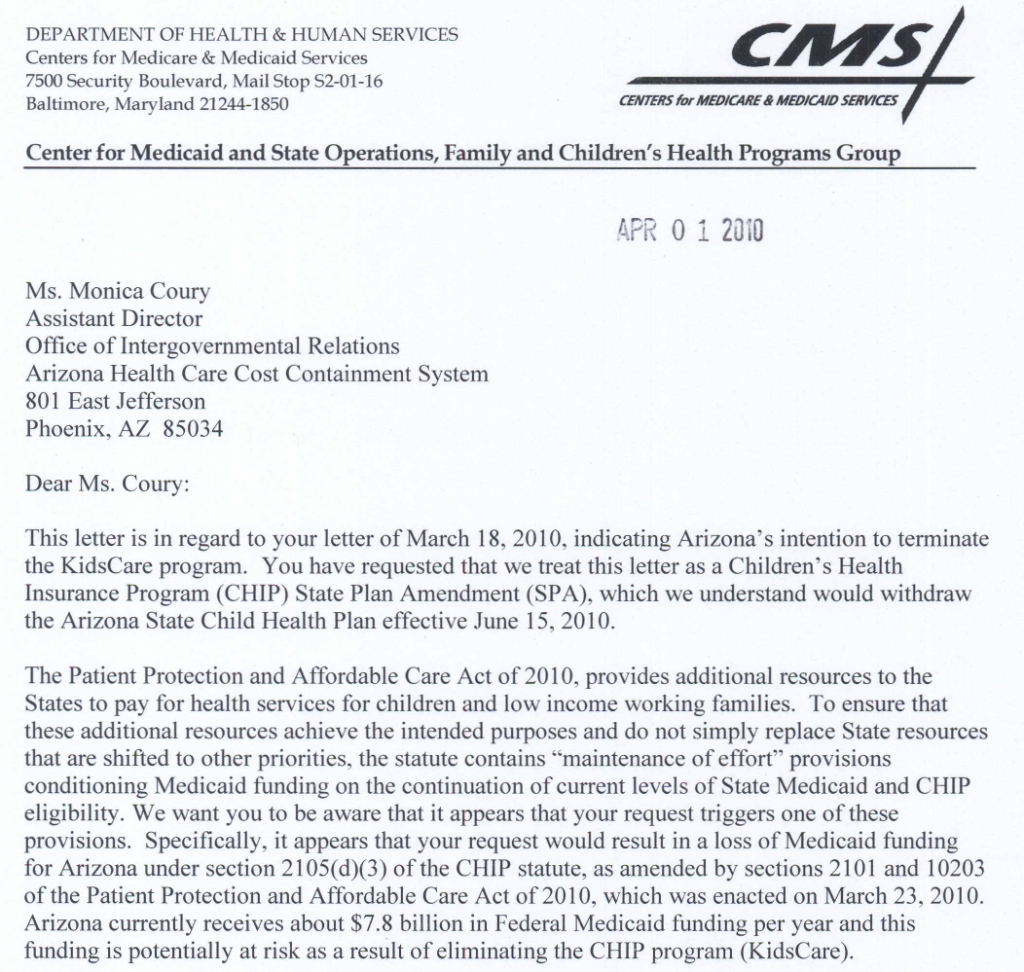It’s official. Arizona, the state that first objected to Obamacare’s Medicaid Expansion, how now entered this new program.
Arizona Gov. Jan Brewer won a battle with state lawmakers this week, defying most other conservatives in her party to get a key component of President Obama’s Medicaid expansion through the Legislature.
The Arizona Senate voted Thursday to approve the measure 18 to 11. That followed approval earlier this week by the state House of Representatives.
The issue had inflamed passions and divided the Legislature for weeks. Things came to a head Tuesday when Brewer called lawmakers into the Capitol in Phoenix for a surprise special session.
Brewer — a vocal opponent of President Obama’s healthcare reform law — came out in support of Medicaid expansion for her state in January and ended up leading a contingent of moderate Democrats and Republicans who won over the objections of some conservative Republicans.
As I discuss in Unprecedented, it was a letter that Brewer sent to HHS in March 2010 asking to opt-out of part of the Expansion which helped seed the government’s defeat.
Here is the key section of the letter:
Based on this letter, Chief Justice Roberts was not able to accept the government’s position that they would never exercise this authority–it was enough that the threat to withhold funding had already been made.
Yet Scalia’s frivolity was, as usual, not entirely without merit. Five days before the Affordable Care Act was signed into law, Arizona, under the leadership of Tea Party governor Jan Brewer, had notified the Department of Health and Human Services that it intended to terminate its participation under the KidsCare program. This program, commonly known as CHIP, was one aspect of the Affordable Care Act’s expansion that provided additional funding to the states to provide health insurance for children.
One week after the Affordable Care Act became law, HHS responded with an ominous and pointed letter: “In order to retain the current level of existing funding, the state would need to comply with the new conditions under the ACA.” This observation was followed by a warning: “We want you to be aware that it appears that your request<el>would result in a loss of [all] Medicaid funding for Arizona.” If Arizona opted out of CHIP, it could stand to lose almost $8 billion in Medicaid funding. That would probably obliterate the state’s budget.
The HHS letter to Arizona contained a not-too-veiled threat of what would happen to other states that did not go along with the Affordable Care Act’s expansion of Medicaid funding. To Arizona, this letter was the equivalent of HHS secretary Kathleen Sebelius acting out the “your money or your life” bit. There was no real choice. This letter was not attached as an exhibit to the Supreme Court briefings, but had been referenced in a single footnote in a motion submitted to Judge Vinson back in Florida.
Relying on this letter, Paul Clement argued that what made this expansion so coercive was that Congress was tying “the states’ willingness to accept these new funds<el>to their entire participation in” Medicaid. In other words, turning down the new funds would result in opting out of the entire program, including the old funds.
The Solicitor General was pressed on this letter by Justices Roberts, Kagan, and Breyer, though he would not state whether HHS maintained that they had the power to revoke all funds.
Breyer pounced, irately asking twice, “Why is it different? Why is it different?” Breyer wanted the solicitor general to give him something to allay the chief justice’s concerns, but Verrilli wouldn’t do it. When Verrilli attempted to jump in, Breyer continued right along, noting that Clement had said that the secretary “would do it” and withdraw the funding. Breyer said, “I would like a little clarification.”
Scalia asked if the secretary had the power to withdraw the funding. Verrilli, begrudgingly admitted that “it is possible.” But, he continued, “I’m not willing to give that away.” In other words, he would not concede that fact.
Kagan would not accept that and asked why Verrilli was not “willing to give [that] away.” Breyer chimed in. “What’s making you reluctant?” Verrilli, with a slight chuckle, replied, “I’m not trying to be reluctant.” He chuckled because he knew from the outset that he was not going to answer the question posed to him.
Scalia interrupted him. “I wouldn’t think that is a surprise question.” The solicitor general was not unprepared. Rather, consistent with his strategy the previous day regarding questions about his limiting principle, he had made a conscious choice not to answer the question. He told the justices, “I’m trying to be careful about the authority of the secretary of Health and Human Services and how it will apply in the future.” Verrilli represented the interests of the United States. He could not pin the government into a position that would bind it in the future. Yet, his risky strategy not to answer this question would backfire, as seven justices would reject his position.
Verrilli had only inflamed the concerns of Roberts, Breyer, and Kagan—the very justices who would soon vote against him on the constitutionality of the Medicaid expansion. The Arizona letter, mentioned only in a footnote in a brief before Judge Vinson in Florida, would prove decisive in the most far-reaching restriction on the spending power in the Court’s history.
As I explain my book, the Solicitor General lacked the authority to answer that question. HHS would not disclaim that power, so the Court did it for them.
